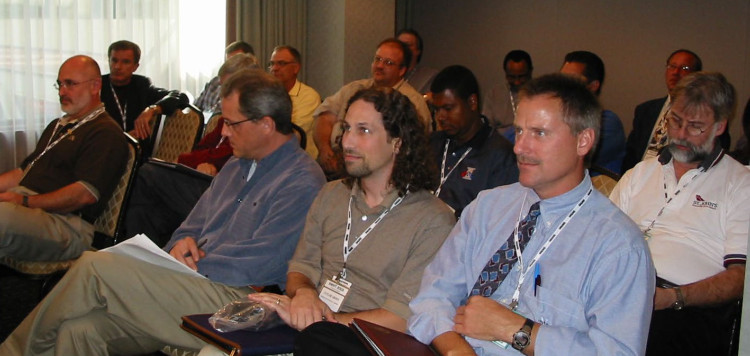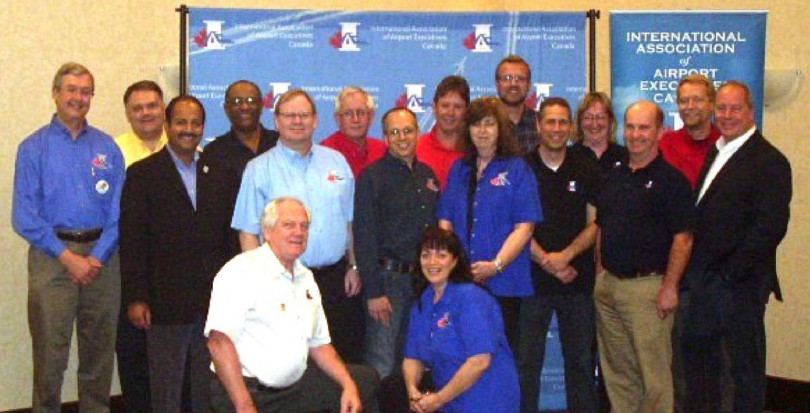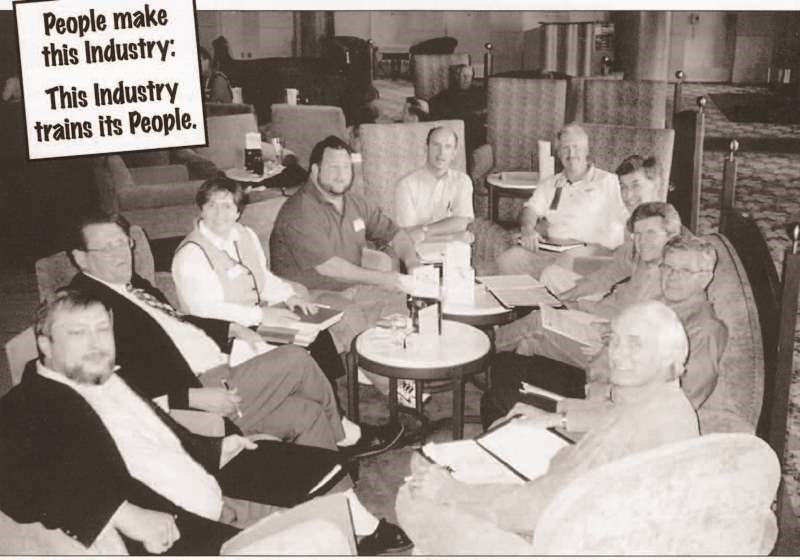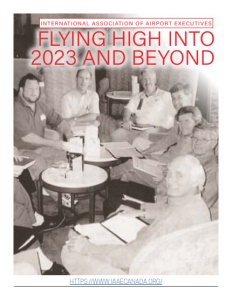International Association of Airport Executives
flying high into 2023 and beyond
With the needs of airport officials in full view, International Association of Airport Executives provides the expertise, education and advocacy flight path
IAAE Canada (International Association of Airport Executives Canada) was established in 1994 in response to the Federal Government’s National Airports Policy (1994). This policy started the process of the federal government divesting itself of ownership of airports in Canada. These airports were offered to provincial and local governments, airport commissions, private business or other interests, in that order. However, the Federal Government did maintain ownership of the National Airport System (NAS) airports, leasing the land to not for profit corporations that would own and operate them.
With the federal government no longer operating the country’s airports, they would no longer be providing training to the professionals that managed airports, but would only be a regulator. Seeing the need for a continuation of training for airport professionals, IAAE Canada was formed. IAAE Canada is a member of the International Association of Airport Executives and is similar to the American Association of Airport Executives.
Since 1994, IAAE Canada has grown to serve the management and operations staff at over 300 airports across Canada. IAAEC delivers a wide range of industry services and professional development opportunities including training, conferences, and the highly respected accreditation program. IAAE Canada assists airport executives in fulfilling their responsibilities to the airports and communities they serve through personal and professional development and training. IAAEC professional development programs fill the void created by Transport Canada divesting of airports and speaks to the challenges of managing small, medium, and large airports in Canada.
IAAE Canada holds an annual conference called FOAM (Facility, Operations & Airport Managers Conference). This two-and-a-half-day event brings together airport professionals from across Canada to participate in the conference, trade show, and networking. The conference has a different theme each year and provides a number of different sessions each day on industry updates, current topics of interest in the industry, and opportunities for improvement such as moving to a green operating environment. Along with the sessions is a trade show that allows corporate members to promote their goods and services to the members to assist them in the operation of their airport. The conference rotates throughout the country and generally allows for a tour of the host airport to take place.

One of the main reasons that IAAE Canada exists is to promote the profession of airport management and the professional development of airport managers in Canada. Since inception, IAAE Canada has helped many members accomplish their goals by providing various educational and career enhancing opportunities. IAAE Canada offers many different ways to learn with on-line training courses, in class training courses, and as a result of the pandemic, virtual training courses. The federal government as regulator is continually placing new regulations onto the aviation industry to which the industry needs to respond and essentially train themselves on these new regulations. The latest of which is the new AMSCR-GRF (Aircraft Movement Surface Condition Reporting – Global Reporting Format) regulations. IAAE Canada with the assistance of a subject matter expert created a new on-line course to train all airfield staff on this new reporting system. The program has been a great success for IAAE Canada and has expanded to include recurrent training as well as the original training for those new to the reporting process.
However, what IAAE Canada is best known for is our accreditation programs, Accredited Airport Executive (AAE) and the newer Accredited Airport Professional (AAP). Obtaining the accredited designation is a great way to command respect within the airport industry. Since 1994, IAAE Canada has been committed to the advancement of aviation professionals by granting certified designations to individuals who demonstrate the ability to handle the challenges and responsibilities of airport management. The accreditation program was created to fill the void of Transport Canada removing itself from the operation of airports and as such the training of their employees to operate airports.

The accreditation process as noted has two different designations: 1) AAE is for current airport personnel with at least 1 year of airport management experience; 2) AAP is available to aviation industry personnel with a minimum of 1 year experience. These prestigious accreditations are comparable to a 4th year university academic level and challenges candidates to prove their knowledge and skills in three distinct ways: by passing an exam; completing a written requirement; and excelling at the Board of Examiners panel interview.
Stage 1 (Exam) is a written 150 question multiple-choice exam developed by the IAAE Canada Accreditation Committee and Board of Examiners with external input from aviation and education experts. The exam is based on the IAAE Canada body of knowledge. In order to assist candidates if they so choose, they can attend the annual Accreditation Academy which is a week-long program, led by an Accredited Airport Executive (facilitator) that reviews the body of knowledge and administers the exam at the end of the week. The exam is composed of 5 segments: Administration & Finance; Planning, Construction & Environment; Operations & Maintenance; Communications & Marketing; and Safety & Security. The candidate must pass each of the segments with a minimum grade of 60%. The exam has a 3-hour time limit.
Stage 2 (Writing Requirement) provides the candidate with multiple options to complete the written requirement, with the candidate’s topic requiring approval by the Board of Examiners, and then graded by three Accredited Members. The options are: a management research paper which must be 20 to 30 pages on a topic broadly applicable to airport management proposing a set of guidelines to manage a problem or set forth an argument for implementing or using a methodology; a case study of 20 to 30 pages to recount/analyze the steps or measures taken by a specific airport or airport system in implementing a project or managing a problem; a presentation requires the preparation and presentation of a topic at FOAM or another recognized industry conference and it must be 20 to 30 minutes including handouts, outline and PowerPoint slides; a proctored essay, the candidate will need to respond to two industry-related questions within a four-hour time limit via an on-line proctored essay system. There is a bank of questions available to the candidate to choose from at the start of the Essay.
Stage 3 (Interview) has all candidates required to complete an oral interview by a panel of at least 3 members of the Board of Examiners. The format of the interview is similar to a high-level job interview and will determine the candidate’s overall knowledge of airport management. The average length of the final interview is two hours. If the candidate is successful in the interview, they are bestowed with the Accredited Airport Executive or Accredited Airport Professional designation.
As a member driven organization, IAAE Canada relies on a strong aviation industry to survive. As with everything, there is a cost with training and accreditation, so healthy airports provide for a healthy IAAE Canada membership.
AT A GLANCE
International Association of Airport Executives
What: The management, advocacy and educational body representing airport officials and staff throughout the country
Where: Ottawa, Ontario
Website: https://www.iaaecanada.org/


